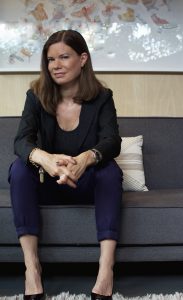16 Dec When People Dislike Your Personal Brand
Not everyone likes your personal brand? It might not be a bad thing.
“You have enemies? Good. That means you’ve stood up for something, sometime in your life” Winston Churchill
The stronger and more identifiable your personal brand becomes, the easier it is for you to appeal to those in your chosen niche: whether that’s becoming known in certain creative circles, or positioning yourself to be promoted to a different team. At the same time, however, the more defined your brand, the more likely you are to face the situation where other people have mixed feelings about you, do not share your values or passions, or simply do not respond to your personal brand. Learning that you can’t be everything to everyone is a hard lesson of personal branding, but psychologist and personal brand consultant Lisa Orban of http://www.goldennotebook.co.uk shares some strategies to help deal with this.
Manage your expectations
There is a saying, “the nicher, the richer.” If you are projecting your personal brand well, then you have a better shot at reaching your target audience, which can boost business and enrich relationships. However, appealing to a target audience may come at a price, as this brand may not appeal to some people, and you may even find some actively dislike it. Accepting that this is part of the evolution of your personal brand makes this a little easier to bear but, hardwired as we are to want people to like us, it can be challenging to deal with if we’re not prepared. Knowing that this might happen – and indeed is even a hallmark of success – can help.
Turn to your values when making choices
We are faced with choices all the time, but the very process of personal branding allows us to make choices based on our values, focusing on who or what is aligned with them…and turning away from those that aren’t. This can help us strengthen our self-belief and the knowledge that we are being true to ourselves. For example, when faced with a toxic relationship or work environment, we may decide that drama goes against our values. Using that knowledge, we can actively choose to step out of that dynamic and not get sucked into someone else’s drama. Of course, that difficult person is not going to like this. However, you have the self-belief and confirmation that you are doing the right thing, for you.
Resist the need to please
It might be general knowledge that “people pleasing” can be detrimental to us, but how often have you agreed to something like working late? Or a party you didn’t want to go to and wasn’t sure how that “yes” came out of your mouth? Be curious about how you feel about something or someone. Listen to your own truth rather than worrying what everyone else thinks you “should” do. Even though it comes from a good place, people pleasing can quickly dilute your personal brand. And, as it’s also impossible to live up to the unrealistic demand to please everyone, it’s a sure-fire way to set yourself up for failure.
Don’t be a “know it all”
You may know someone who needs to show that they know something about everything: politics, films, sport, music, etc. They may be looking to dazzle you with their broad expertise, but instead may come across as a show off or just desperate to impress. Being a “know it all” is a close cousin to people pleasing. If this tends to be you, take the pressure off yourself. Putting this kind of unnecessary stress on yourself is a recipe for anxiety. You can never fulfill such exceedingly high self-demands. Instead, cultivate the art of asking questions and letting others share their wisdom. Giving others a chance to shine is a generous and empowering act that people tend to greatly appreciate. Focus on gaining and sharing knowledge around a few specific subjects that reflect your personal brand. Ask yourself, what do you want to be known for?
Shoulding
Much of people pleasing and the need to be the endless expert comes from an underlying belief system of rigid demands related to “shoulding”. These include “I should be an expert”, “I should go to this”, “She should like me”, etc. With this type of “should” typically comes perfectionism and a lack of choice. Instead, lighten things with a more flexible and rational “I prefer to…” or “I would like…”. Better yet, swap a “could” for the “should” where it works,. This transforms a rigid demand into a more flexible choice. Remind yourself that it is impossible to please everyone. The fastest way to diminish your personal brand is to try to be everything to everyone!
Let go and build acceptance
As your personal brand becomes more defined, it may also become more polarizing. Look at strong personal brands of our times such as Simon Cowell or Adele. They may have many fans but they also get a lot of criticism as well. As you define your personal brand, you may find that some people may challenge you, distance themselves or just drop out of your life. Building acceptance around this and turning to your core brand attributes (purpose, passion, vision, values) will help build self-belief to hopefully see you though such transitions, and being prepared that this may happen may ease the evolution a little.
That said, you don’t have to take it passively if you value these people and want to keep in your life (for example, those with whom you share a history). While they may not be part of your target audience or “core tribe”, some individuals may still be connected to your life in some meaningful way. See if you can navigate distancing by finding specific ways to connect with them and build on those.
Find your tribe
We might be tribal people (wanting to belong is in our DNA!), however, in this day and age, we have choice and can afford to be more selective with our tribes! Finding a tribe or family of people that support you is the best way of affirming that you’re on the right track. Ask yourself: Who is responding to you? Who can you connect with and cultivate that connection? If you want a particular side of your brand to come to the fore, such as your creative side for example, where can you meet people who can help you nurture this?
Look after yourself…and be discerning
It’s important to ensure that you look after yourself. Nutrition, exercise, etc. are all important but discernment is another key that we rarely talk about. If you’re building a brand as a speaker, you don’t have to accept every invitation to speak. Indeed, the ones you turn down can be just as influential in creating your brand as the ones you accept.
While stepping outside your comfort zone is one way to grow, it may not always be good for you if it’s not in your “self care zone” and not suited to your type of personal brand. One of my clients, who was writing a book, was excited to be invited to moderate a panel, but in reality she found that she hated it. Next time she will politely decline as she knows that her skill and her enjoyment is found more in writing …which is her personal brand after all!
Bringing together her extensive training, experience and passion in both psychology and branding, Dr. Lisa Orban founded Golden Notebook. A clinical psychologist, Lisa trained and practised in New York City for eleven years before relocating to London. Lisa helps clients make a name for themselves by discovering their distinct and authentic personal brand. She takes a unique approach to personal branding that combines psychological assessment and theory with branding strategies to create for powerful and enduring individual change and personal impact. She is currently offering complementary introductory consultations.







No Comments